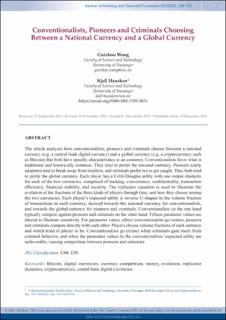| dc.contributor.author | Wang, Guizhou | |
| dc.contributor.author | Hausken, Kjell | |
| dc.date.accessioned | 2022-03-07T10:30:50Z | |
| dc.date.available | 2022-03-07T10:30:50Z | |
| dc.date.created | 2022-03-05T19:31:43Z | |
| dc.date.issued | 2021-12 | |
| dc.identifier.citation | Wang, G., Hausken, K. (2021) Conventionalists, Pioneers and Criminals Choosing Between a National Currency and a Global Currency. Journal of Banking and Financial Economics (JBFE), 2 (16), 104-133. | en_US |
| dc.identifier.issn | 2353-6845 | |
| dc.identifier.uri | https://hdl.handle.net/11250/2983360 | |
| dc.description.abstract | The article analyzes how conventionalists, pioneers and criminals choose between a national currency (e.g. a central bank digital currency) and a global currency (e.g. a cryptocurrency such as Bitcoin) that both have specific characteristics in an economy. Conventionalists favor what is traditional and historically common. They tend to prefer the national currency. Pioneers (early adopters) tend to break away from tradition, and criminals prefer not to get caught. They both tend to prefer the global currency. Each player has a Cobb-Douglas utility with one output elasticity for each of the two currencies, comprised of backing, convenience, confidentiality, transaction efficiency, financial stability, and security. The replicator equation is used to illustrate the evolution of the fractions of the three kinds of players through time, and how they choose among the two currencies. Each player’s expected utility is inverse U-shaped in the volume fraction of transactions in each currency, skewed towards the national currency for conventionalists, and towards the global currency for pioneers and criminals. Conventionalists on the one hand typically compete against pioneers and criminals on the other hand. Fifteen parameter values are altered to illustrate sensitivity. For parameter values where conventionalists go extinct, pioneers and criminals compete directly with each other. Players choose volume fractions of each currency and which kind of player to be. Conventionalists go extinct when criminals gain more from criminal behavior, and when the parameter values in the conventionalists’ expected utility are unfavorable, causing competition between pioneers and criminals. | en_US |
| dc.language.iso | eng | en_US |
| dc.publisher | University of Warsaw, Faculty of Management | en_US |
| dc.rights | Navngivelse 4.0 Internasjonal | * |
| dc.rights.uri | http://creativecommons.org/licenses/by/4.0/deed.no | * |
| dc.subject | bitcoin | en_US |
| dc.subject | kryptovaluta | en_US |
| dc.subject | penger | en_US |
| dc.subject | nasjonal valuta | en_US |
| dc.subject | spillteori | en_US |
| dc.title | Conventionalists, Pioneers and Criminals Choosing Between a National Currency and a Global Currency | en_US |
| dc.type | Peer reviewed | en_US |
| dc.type | Journal article | en_US |
| dc.description.version | publishedVersion | en_US |
| dc.rights.holder | © 2021 Authors. | en_US |
| dc.subject.nsi | VDP::Samfunnsvitenskap: 200::Økonomi: 210 | en_US |
| dc.source.pagenumber | 104-133 | en_US |
| dc.source.volume | 2 | en_US |
| dc.source.journal | Journal of Banking and Financial Economics (JBFE) | en_US |
| dc.source.issue | 16 | en_US |
| dc.identifier.doi | 10.7172/2353-6845.jbfe.2021.2.6 | |
| dc.identifier.cristin | 2007809 | |
| cristin.ispublished | true | |
| cristin.fulltext | original | |
| cristin.qualitycode | 1 | |

